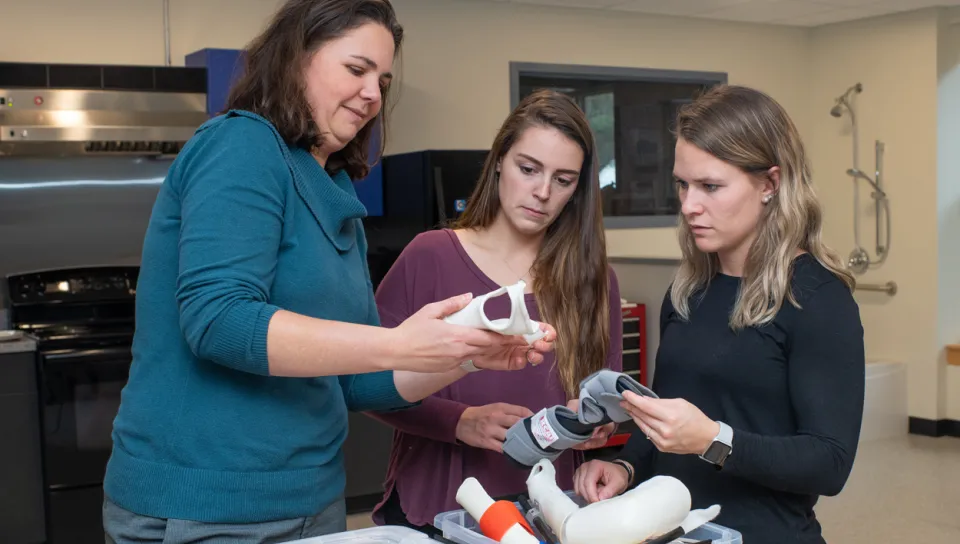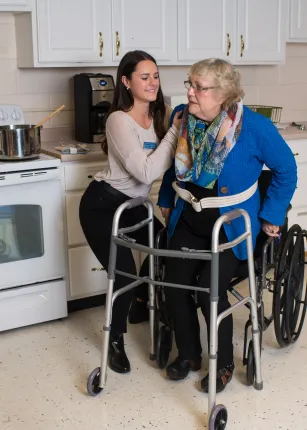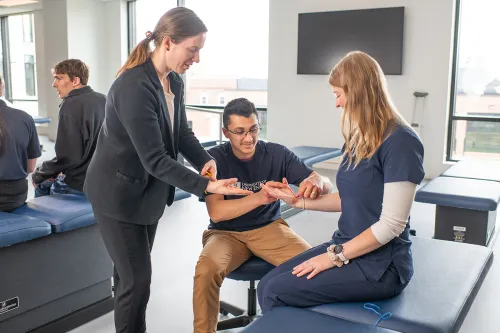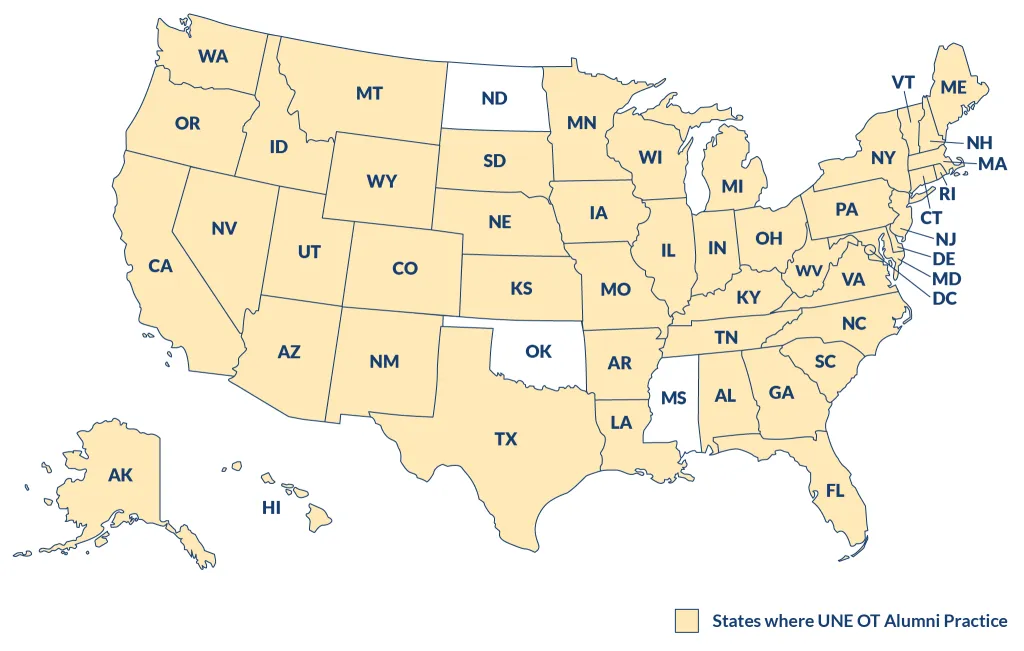Earn Your M.S. in Occupational Therapy at Maine’s Leading Health University
As an M.S.O.T. student at UNE, you will be part of a community of scholars and students who take pride in mobilizing the power of occupation to improve lives. UNE’s Occupational Therapy degree program, located in Maine, will prepare you for a rewarding career helping patients experience independence in performing the daily activities that give them purpose.
Facilitating a culture of service to all populations is at the heart of what you learn while enrolled in UNE’s OT degree program. Above all, our program helps you develop a lifelong passion and purpose for a rewarding career as an occupational therapist.
Why UNE for Your Master of Science in Occupational Therapy
- You will experience all areas of OT practice to help you meet the needs of pediatric, adult, and geriatric patients and communities and to develop diverse career options.
- You will learn in state-of-the-art facilities on our Portland, Maine, campus.
- You will have the opportunity to do fieldwork in locations across the country, from Atlanta to Honolulu.
- You will be taught by leading faculty who are performing important occupational therapy research and shaping the way occupational therapy is conceived, taught, and practiced.
- You will learn how to collaborate in today’s team-based health care by training alongside UNE students who are future physicians, nurses, and other health professionals.
- UNE is ranked in the top 50 Occupational Therapy programs by U.S. News & World Report.
of our students pass the NBCOT exam within one year of graduation
states where you can do clinicals
Discover UNE’s M.S. in Occupational Therapy Program
What will you study? Occupational Therapy Program Curriculum Overview
During UNE's 24-month in-person Master of Science in Occupational Therapy program, you start with a foundation of theory, therapeutic use of self, functional movement analysis, and occupational analysis. As you progress toward your occupational therapy degree, emphasis is placed on mental health practice; practice with children; rehabilitation, disability, and participation (RDP) with adults and older adults; practice skills; and exploration of context, research, and leadership.
Curriculum
| Program Required Courses | Credits |
|---|---|
| OTR 502 – Occupational Analysis | 3 |
| OTR 505 – Foundations in OT | 3 |
| OTR 520/520L – Functional Movement Analysis w/Lab | 4 |
| OTR 521 – Biopsychosocial Dimensions of Mental Health & Wellness | 3 |
| OTR 521L – OT Interventions in Mental Health & Wellness | 2 |
| OTR 527 – Rehabilitation, Disability, and Participation in Adulthood | 4 |
| OTR 527L – OT Interventions in Adulthood | 2 |
| OTR 528 – Fieldwork Seminar Mental Health (includes level I fieldwork) | 1 |
| OTR 529 – Integrative Practice - Adults | 2 |
| OTR 531 – Health Conditions and Occupational Therapy | 3 |
| OTR 532 – Therapeutic Use of Self and Group Process | 3 |
| OTR 601 – Fieldwork IIA | 6 |
| OTR 602 – Fieldwork IIB | 6 |
| OTR 604 – Fieldwork Seminar RDP (includes level I fieldwork) | 1 |
| OTR 605 – Fieldwork Seminar Pediatrics (includes level I fieldwork) | 1 |
| OTR 606 – Occupational Engagement in Communities and Contexts | 3 |
| OTR 610 – Integrative Practice with Children & Youth | 3 |
| OTR 611 – Biopsychosocial Dimensions of Children & Youth | 3 |
| OTR 611L – OT Interventions with Children & Youth | 2 |
| OTR 619 – Evidence-Based Research Seminar | 3 |
| OTR 621 – Health Care Management & Delivery | 3 |
| OTR 628 – Research Methods & Design | 3 |
| OTR 630 – Essentials for Practice | 3 |
| OTR 640/640L – Neuro-Occupation w/Lab | 3 |
| OTR 650 – Leadership/Advocacy with Del Syst | 3 |
| Minimum Total Required Credits | 73 |
|---|
Fieldwork Experiences
Level I Fieldwork
Students complete Level I Fieldwork experiences as part of instructional courses, reinforcing course concepts. Students are supervised by qualified personnel, who may include occupational therapists, teachers, social workers, public health nurses, and physical therapists.
Level II Fieldwork
Emphasizes the application of knowledge by providing the student with in-depth experience in delivery of occupational therapy service to patients/clients. Students complete two (2) full-time level II fieldwork experiences, each is twelve (12) weeks long.
The expenses incurred for room and board during these internships, and travel to and from the fieldwork sites, are the responsibility of each student. Students may complete fieldwork at any approved location.
The requirements for Level II fieldwork include:
- A minimum of twenty-four (24) weeks, full time of Level II Fieldwork experience, preferably with at least twelve (12) weeks on a full-time sustained basis
- Completion of all fieldwork experience no later than eighteen (18) months following completion of the didactic portion of the curriculum
- Supervision provided by a licensed occupational therapist with at least one (1) year of experience
Graduation Requirements
Students must successfully complete all courses before graduation and fulfill all curriculum requirements.
Academic and Technical Standards
WCHP Academic Policies
The Department of Occupational Therapy, the Westbrook College of Health Professions, and the University of New England are committed to offering a quality Occupational Therapy education program that complies with the evaluative criteria of the ACOTE (Accreditation Council of Occupational Therapy Education). The program provides learning experiences to enable graduates to achieve the outcomes required for the practice of Occupational Therapy. Please refer to the WCHP Graduate Program Progression Policies and Procedures (PDF) for a detailed description of academic standards.
M.S.O.T. Technical Standards
Technical Standards for the Occupational Therapy Program
The following abilities and skills are necessary to engage in the Occupational Therapy department at the University of New England:
- Cognitive abilities to analyze, synthesize, and integrate information related to anatomy, physiology, human development, psychology, sociology, kinesiology, and occupational studies in order to make clinical judgments for planning and implementing effective occupation-based interventions.
- Critical thinking and judgment that promote safety, optimal occupational performance, remediation, and adaptation.
- Time management and organizational skills to meet the demands of the classroom and practice environment.
- Interpersonal skills that include participating in classroom discussion, conducting interviews, observing body language, listening, responding, collaborative goal setting, and developing intentional relationships.
- Evaluation of the performance of self and others, and making adjustments in behavior or promoting behavioral change in others to enhance occupational performance.
- Communication skills to develop positive client relationships, complete written documentation consistent with OT practice, and participate as a health care team member.
- Physical abilities to perform physical examinations, such as balance, range of motion, and strength, and to accurately, safely, and efficiently use assessment tools, equipment, and other materials during occupational therapy intervention.
- Emotional stability to handle the demands of a practice environment. This includes acting in a professional manner, being dependable, meeting commitments, and being forthcoming about one’s own needs.
- Ability to maintain personal appearance and hygiene conducive to working in clinical and community settings.
To learn more, see the Class of 2027 Occupational Therapy Student Handbook (PDF) or view the Academic Catalog.
View the Class of 2026 Occupational Therapy Student Handbook (PDF).
Fieldwork
You will also complete Level I Fieldwork in the areas of mental health, children and youth, and adults and older adults. After completion of your didactic coursework, you will complete two 12-week Level II Fieldwork rotations, during which you will work alongside OT practitioners addressing clients’ specific occupational needs. You will then complete one rotation in the area of RDP and one in either mental health, children and youth, or another RDP setting.
Then you return to our Portland, Maine campus for a one-week immersion of synthesis, exploration, and exam prep. Upon successful completion of coursework and fieldwork, you may take the national OT certification examination.
Fieldwork Placement
We maintain relationships with a diverse range of clinical sites in Maine, New England, and across the country. Our sites have included level I trauma centers, prestigious rehab hospitals, private clinics, mental health settings, schools, nature and farm-based settings, OT practice in community, and beyond.
Career Paths for Occupational Therapy Grads
As an occupational therapist, you design creative client-centered interventions and then work closely with clients to implement them. You must be adept at working with others and have a keen mind for problem-solving. You must have the underlying knowledge to diagnose the physical, psychological, and social aspects of your clients’ deficits, and the patience to guide them through their transformation.
This is an extremely rewarding profession through which you improve the lives of your clients in clearly tangible ways. It is immensely satisfying to help a client assess and then overcome the challenges that were preventing him or her from fully participating in life’s daily tasks and leisure activities. You have the ability to impact your clients’ ability to succeed at home, at school, at work, and in the community.
Your work might help a:
- Newborn learn to suck and swallow
- Toddler learn to play with toys
- Child keep up with friends on the playground
- Teen develop positive regard for self
- Veteran return to life at home
- Athlete explore adapted sports
- Individual recovering from a stroke relearn life skills





Occupational Therapy Facilities
M.S.O.T. students learn hands-on skills in a variety of environments across UNE’s Portland Campus for the Health Sciences, developing occupation-based practice to prepare for work in schools, early intervention settings, community agencies, and health care organizations.
Tour Our State-of-the-Art Learning Spaces
Occupational Therapy Lab
UNE’s Occupational Therapy Lab is a dynamic space on the Portland Campus that promotes integrated learning throughout the OT curriculum. Many OT courses are designed holistically, so faculty and students can participate in multiple learning formats within a single class. Groups may flow between lectures, small group discussions, clinical practice activities, and reflection.
Large and full of natural light, the OT Lab features a classroom for lectures and hands-on lab training sessions, as well as functional fixtures to support occupational engagement across the lifespan. This includes exercises for key occupations such as meal preparation (in a full kitchen), sleep and rest, bathing and grooming, and play.
3D Printing/OT Library
The 3D printing/OT library space houses our 3D printers and a wide range of occupational therapy books for students to utilize throughout their time at UNE. Students are encouraged to design and create adaptive equipment and tools to deepen their learning under the mentorship of faculty.
Gross Anatomy Lab
Located in the Harold and Bibby Alfond Center for Health Sciences, UNE’s human body donor/gross anatomy lab offers an immersive environment for interprofessional education across disciplines within our Portland Campus. This is yet another example of how UNE brings hands-on learning to a whole new level.
Take a 3D tour of the gross anatomy lab
Interprofessional Simulation and Innovation Center (ISIC)
Guided by skilled professional staff and instructors in the ISIC, M.S.O.T. students can participate in simulations specifically designed to enhance the development of clinical judgment and critical-thinking abilities. Rather than just hearing and reading about difficult or unusual patient cases, our students experience them by treating high-fidelity patient simulators, patient actors, and virtual patients in scenarios that mimic real-life clinical practice. Debriefings with peers and faculty after each simulation experience provide the opportunity to reflect on any challenges encountered.
Learn more about the Interprofessional Simulation and Innovation Center
OT in the 3D Printing Lab
Occupational Therapy: Team-Based Learning
When students from different health professions disciplines learn with, from, and about each other to better understand different professional roles and expertise, great things can happen. In UNE’s M.S.O.T. program, you will be studying alongside students from other programs, including the Doctor of Osteopathic Medicine and Doctor of Dental Medicine program, gaining the skills to collaborate and lead in today’s team-based care. UNE is proud to be the only institution in New England that is part of the National Center for Interprofessional Education and Practice’s prestigious Innovation Network.
You also have the opportunity to apply this collaborative participation toward your Interprofessional Honors Distinction.
Occupational Studies/M.S.O.T. 3+2
Now earning your Master of Science in Occupational Therapy is faster than ever before. Our accelerated program will allow you to earn credits toward a Master of Science in Occupational Therapy degree during your coursework for a Bachelor of Science in Occupational Studies. By combining the two programs, you can become a working occupational therapist in as little as five years.
Meet UNE M.S.O.T. Students
A Health Care Education Campus in Portland, Maine
UNE M.S.O.T. students study on the Portland Campus for the Health Sciences, a quintessential New England quad that has been welcoming students for more than a century. Lined with lush trees and brick buildings, the campus sits in a quiet neighborhood just a short drive from the downtown waterfront. Portland, named “America’s Most Livable City” by Forbes and “Foodiest Small Town in America” by Bon Appetit, is about 100 miles from downtown Boston.
Who can apply to our Occupational Therapy Degree Program?
To apply to our OT degree program, you must hold a bachelor’s degree from a U.S. regionally accredited institution, or international equivalent.
The University of New England Master of Science in Occupational Therapy program participates in the Occupational Therapy Centralized Application Service (OTCAS). All applicants are required to apply online through this service.
Financial Aid at UNE
Finance your education through loans, grants, and scholarships. We are committed to making our occupational therapy degree program as affordable as possible.
Accreditation, NBCOT Pass Rates, and Graduation Rates
The Master of Science in Occupational Therapy at UNE was initially accredited in 1985 and has been continuously accredited by the Accreditation Council for Occupational Therapy Education (ACOTE) of the American Occupational Therapy Association (AOTA) since that time. Our next accreditation visit will occur in the 2034/2035 academic year. ACOTE is located at 7501 Wisconsin Avenue, Suite 510E, North Bethesda, MD 20814. ACOTE’s telephone number, C/O AOTA is (301) 652-6611, and its web address is www.acoteonline.org.
Graduates of the program will be eligible to sit for the national certification examination for the occupational therapist administered by the National Board for Certification in Occupational Therapy (NBCOT). After successful completion of this exam, the individual will be an Occupational Therapist, Registered (OTR). In addition, all states require licensure to practice; however, state licenses are usually based on the results of the NBCOT Certification Examination. A felony conviction may affect a graduate’s ability to sit for the NBCOT certification examination or attain state licensure.
NBCOT Exam Pass Rates and Graduation Rates
M.S. program graduates are eligible to take the certification examination administered by the National Board Certification in Occupational Therapy. Learn more about the exam, UNE pass rates, and UNE graduation rates
Apply Today

Occupational Therapy Degree FAQ
What is occupational therapy?
Occupational therapy (OT) supports health and wellness by helping patients participate in the daily activities (occupations) that are meaningful to them. Daily occupations can range from tying your shoes, to cooking, to playing your favorite sport. With an occupational therapy career, you’ll work with clients to modify tasks, activities, contexts and environments to better support their engagement and participation in the things they want to do.
UNE’s Portland, Maine-based Master of Science in Occupational Therapy (M.S.O.T.) degree program provides aspiring occupational therapists with the skills needed to make a difference in the lives of their future patients. Through our expert faculty, state-of-the-art facilities, and interprofessional education practices, UNE OT students have the opportunity to learn side-by-side with students from other health professions.
What is the difference between occupational therapy and physical therapy?
Occupational therapy and physical therapy work together frequently, and they have similarities as well as important distinctions. An occupational therapist (OT) is ultimately concerned with addressing how a client accesses and participates in activities that hold meaning within day-to-day functioning. Physical therapists (PTs) focus on improving the patient's ability to move their body. PTs help individuals to avoid surgery and prescription medications, maximize mobility, manage pain and chronic conditions, and improve overall physical function and fitness.
As a student in UNE’s M.S.O.T. degree program, you have the opportunity to collaborate with our physical therapy faculty and students in classroom, clinical, and even global settings. UNE is one of a handful of private universities with a comprehensive health education mission that encourages interprofessional learning opportunities.
What does an occupational therapist do?
An occupational therapist is a health care professional that works in a variety of settings including hospitals, schools, and community centers to help patients participate in important activities. As an occupational therapist, you could work with neurodivergent toddlers learning to play with toys, help injured athletes explore adaptive sports, support senior citizens in arranging their kitchen so they can cook at home, and much more.
Practicing OTs typically start patient treatment with an evaluation of their patient’s history, experiences, and goals. Occupational therapy treatment continues with a customized intervention plan that helps the patient participate in the occupations that matter to them.
With an occupational therapy master’s, you’ll be able to support people in participating in activities that bring them a sense of purpose, meaning, and independence.
How long does it take to become an occupational therapist?
Becoming an occupational therapist will require you to earn a four-year undergraduate degree, as well as a two-year OT master’s degree from an accredited occupational therapy graduate program. From there, you will have to pass a licensure exam in order to practice OT.
Undergraduate Degree
If you intend to become an occupational therapist, it’s a good idea to start with a bachelor’s degree within a relevant area, such as psychology, biology, or even art education. UNE’s M.S.O.T. degree program accepts applicants with many different bachelor’s degrees, as long as they have taken the UNE Master of Science in Occupational Therapy prerequisite courses. Our M.S.O.T. faculty have found that graduates of UNE’s Occupational Studies undergraduate program are well prepared to enter UNE’s OT master’s program. You can now become a working occupational therapist in as little as five years through UNE’s Accelerated Occupational Studies/Master of Science in Occupational Therapy 3+2 program.
Graduate Degree
The next step is to attend an accredited university to earn your occupational therapy graduate degree. UNE’s Masters of Science in Occupational Therapy (M.S.O.T.) program is an excellent option if you are seeking a career as a practicing clinician in occupational therapy. Qualified applicants can complete UNE’s OT master’s program in two years of study which includes four semesters of coursework and two semesters of fieldwork.
Pass the NBCOT
After completing your M.S.O.T., you will need to pass the National Board for Certification in Occupational Therapy (NBCOT) certification examination to practice in the United States. The NBCOT exam is offered to graduates via computer and is scheduled “on-demand” at various testing centers across the USA. Since 2019, UNE OT graduates have had a 99% pass rate of the NBCOT within one year of graduating.
Do you need a doctorate in occupational therapy?
You do not need a doctoral degree to be a licensed occupational therapist. There are currently two academic entry points into the profession of occupational therapy for occupational therapists, an entry level master’s degree or an entry level doctoral degree.
M.S.O.T. graduates who pass the NBCOT are prepared to enter clinical OT practice and perform virtually all the same roles as someone with a doctoral occupational degree, with less time and investment needed.
At UNE, our two-year M.S.O.T. degree program is an excellent option if you are seeking a career as a practicing clinician in occupational therapy.
What is the best occupational therapy program for me?
When looking for the right occupational therapy degree program, academic quality is a key consideration. High graduation rates and NBCOT licensure exam pass rates are useful indicators of how well any OT program’s students are prepared for success.
You should also choose an OT program that offers an engaging educational experience. In your two years of study at UNE, earning a master’s in OT, you’ll be immersed in the study and practice of occupational therapy. In addition to coursework, students have the opportunity to be involved in community-based projects, pursue leadership opportunities, and engage in research and scholarship. All of these experiences are designed to enhance your entry-level skills as you work toward your goal of becoming an occupational therapist.
While in UNE’s M.S.O.T. degree program, you’ll learn side-by-side with students from other health care disciplines, gaining the skills to collaborate when you enter the workplace. UNE pursues a health-focused mission that includes programs in medicine, dental medicine, nursing, pharmacy, and an array of allied health professions, so UNE students benefit from an interprofessional health education.
Another reason for choosing an occupational therapy program is the amount of academic and community support. At UNE, OT students learn in a non-competitive and supportive environment, and UNE faculty genuinely care about their students. There are also plenty of academic support systems available to help students stay on track.
Location and quality of life are other considerations. Students of the UNE OT master’s program study on our Portland, Maine campus, a classic New England quad with brick buildings and tall trees that's about 100 miles from downtown Boston.
Of course, you should attend a program that fits your financial capabilities and is in good national accreditation standing through ACOTE (Accreditation Council of Occupational Therapy Education).
What is an occupational therapist salary?
The median annual Occupational Therapist salary was $98,340 in May of 2024, according to the Bureau of Labor Statistics. OT salaries can depend on where you work, level of training, and experience. UNE M.S.O.T. alumni are employed all over the U.S., from Alaska to Maine, California to Florida, and everywhere in between.


